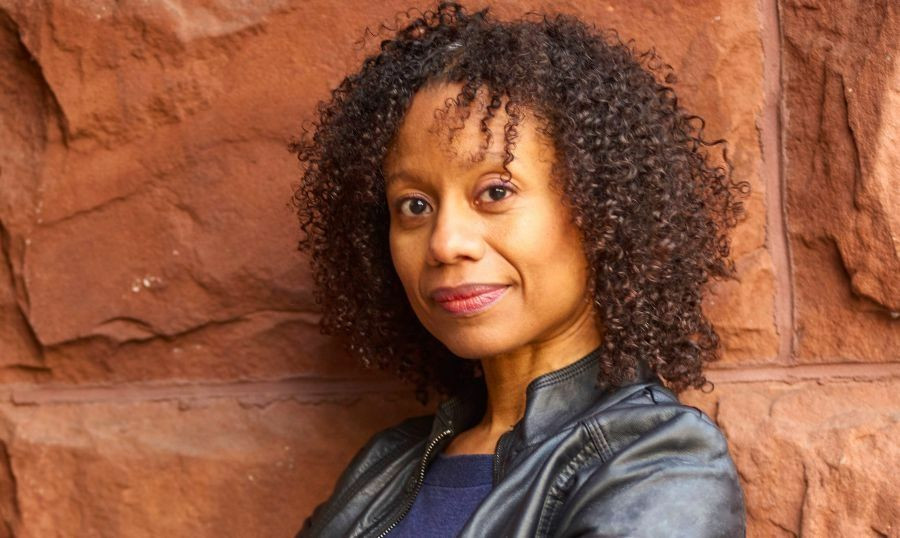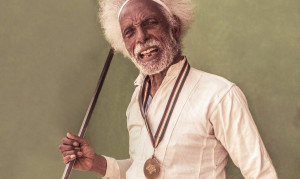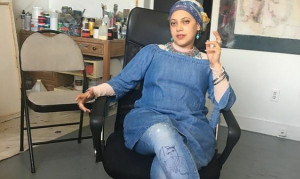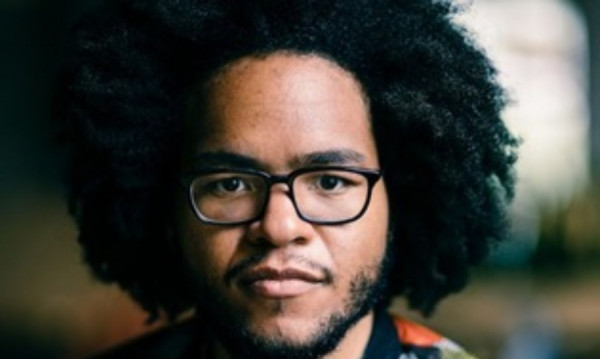deGannes, like many artists with plans for 2020, found herself locked down at home after the shutdown of live theatre around the world. However, there’s a Zambian proverb that says, “the world's of the elders do not lock all the doors; they leave the right door open.” The crisis created by a global pandemic turned out to be just the opportunity deGannes needed to refocus on her poetry, resulting in her being shortlisted for the prestigious Montreal International Poetry Prize and an upcoming collection of new work, “Music for Exile”, slated for publishing early next year.
I had the pleasure of speaking to Nehassaiu deGannes in Brooklyn, where she’s based, about the inspirations for her new book, the excitement of being shortlisted after a hiatus from writing, and her thoughts on the role of art in times of uncertainty.
Congratulations on being shortlisted for the Montreal International Poetry Prize! How affirming is it for you to be included in the shortlist for this award a few months before the release of your first book-length poetry collection? How does something like that affect your confidence?
I think it’s quite affirming and a wonderful way of returning to the poetry community. I’m both an actor and a poet, but the last several years I was focused primarily on being an actor. Living through this pandemic has meant watching theatres close. Though I was excited about shepherding this book project, I also had a major theatre contract for this spring cancelled due to Covid. So it was great to be able to pivot back to my writing and to have that available to me...and then to be shortlisted was a delight.
I noticed a blog passage on your website where you mentioned the poem you submitted (To Find, To Be) was written in May when you thought you had no poems in you. How has Covid-19 affected your creativity? What do you do to stay positive and engaged?
Thinking back to 8 months ago when all this started - I’m based in Brooklyn, New York, and New York was the epicenter of the pandemic. I had a sense of pause, like there was a diversion of the creative river. I did more reading than generating work. I was really caught up in the silence of the streets and Governor Cuomo’s daily announcements. My mother, who is based in Toronto, was the one who alerted me to the Montreal prize submission. I initially thought I couldn't craft a poem in time because most of my completed poems were slated for my book, and yes, I wasn’t sure if I had anything else in me at the time. Sometimes an opportunity like that creates a space, context, and a community. It was a big shift, as a collaborative theatre artist who believed that acting was what I was going to do this Spring, to be alone in a type of solitude that I hadn’t processed for a while; the solitary act of writing a poem. So it’s been wonderful to be reminded of my own resilience and that the solitary act of writing poetry was my first home. I’m extremely grateful to be able to return to that and know that I don’t have to be dependent upon leaving my home and going to a studio in order to be a genuine artist.
In this time of, as you put it, necessary distance and isolation, what role do you think poetry and the arts, in general, should play in the world?
Poetry can hold a space for elegy and to meditate on the magnitude of loss. I’m very grateful for the space to sit with grief ranging from personal, neighbourhood, citywide, countrywide, and collective global grief. As someone raised in Canada, born in the Caribbean, based in New York, I was very tuned into how this affected people in different places. Poetry can hold a space where the personal voice meets the epic voice in a distilled way. When many of my peers were pivoting to virtual theatre, most were just trying to keep theatre alive. Not that they shouldn’t have been, but I don’t think they were necessarily focused on creating theatre that was speaking to the current moment. For me, poetry allowed me to speak directly to what I was experiencing in a way that wasn’t just autobiographical but tried to give voice to the magnitude of this historical loss.
You were born in Trinidad & Tobago, grew up in Canada, and lived for a while in the middle east, so your life’s journey has been somewhat migratory. I don’t suppose it should be surprising that two of the themes of “Music For Exile” include uprooting and displacement. Are you exploring these themes through the lens of your personal life? How so?
I would say I am exploring these themes through the lens of my personal life. I left the Caribbean when I was 3 years old, but it was also when I was coming into language. I was very precocious and was already a storyteller at the age of 3. All of my schooling, from kindergarten all the way up to undergrad was in Canada. I’m aware of my sense of the Caribbean being one of personal and family mythology. My dad was in graduate school at the time. I remember leaving tropical weather and arriving during the ice carving festival and being very much aware that I was in a different place. Even then, I understood I was a Trinidadian girl living in Canada. At the same time, I was very lucky to have had great experiences in school with very strong Canadian friendships. So this sense of uprooting, displacement, and a longing or search for home, is a very strong thread in this collection. I have a personal recognition that I’m made up of a composite of a lot of different places from my migratory journey, but with the feeling of not fully belonging to any one place. There are other ways in which I meditate on that uprooting and displacement for, not just myself, but also historical figures.
That “epic and personal” you were talking about…
Right. For example, *Marie-Joseph Angelique. There was this amazing moment when I was living in Providence, Rhode Island, my first time in New England, where I initially believed it wouldn’t be much different from southern Ontario. When I arrived I realized it was quite different. There were iconic white picket fences, people weren’t really out in the streets in certain neighbourhoods, and they didn’t really sit out on their front porches. It was sort of staid and quiet. Poetically, I found myself drawn to exploring my own migratory journey. I was struck by some of the street names, as well as the official name of the state of Rhode Island... “State of Rhode Island and Providence Plantations.”
I’d heard Marie-Joseph Angelique’s story by way of “Daniel G. Hill’s “The Freedom Seekers.” That wasn’t Canadian history taught to me in school. I found myself mapping her story on the New England landscape. It was after writing that poem that Afua Cooper, the Jamaican-born Canadian poet and scholar, told me there was historical evidence to suggest that Marie-Joseph was purchased in New England, and quite possibly in Rhode Island. More enslaved Africans entered the Americas through the port of Rhode Island than any other colony. I just love that as a poet who is interested and engaged by historical narratives, that the creative license of poetry gave me this freedom to follow my own kind of associative logic not necessarily tied to historical research, but to then discover there was something intuitively guiding my logic. Years later, I developed a one-woman show that included triangulation and mapping which delved into that in greater detail.
*Marie Joseph Angelique was an enslaved Black woman in New France, tried and executed for setting fire to her owner’s home in 1734.
According to the editor’s citation (Tupelo Press), your poetry “reveals the violence, injustice, and suffering that are embedded within the very foundations of grammar itself.” Is that something you set out to do with this poetry collection, and how do you address violence, injustice, and suffering in grammar?
It is something I set out to do, though I maybe wouldn’t have phrased it in the same way the editor did. Dionne Brand’s book “No Language is Neutral” is definitely a work that cracked some things open for me in terms of memory and contending with the very language that gives shape to our articulation of those memories. In terms of violence and justice, there are poems in the collection that deal with police brutality. There’s a poem based on an experience in which I was home when an intruder broke in, and although I wasn’t harmed in the latter situation, I remember calling 911 dispatch and the dispatcher asking specifically if the intruder was a Black male. I had to confront that question. There are poems that deal with intimate violence, whether that’s familiar violence or forms of sexual abuse. Poems that meditate on the ways in which Black bodies and Black women’s bodies can be exiled not only through the literal migratory journey of place to place, but exiled from our own bodies through forms of oppression that rupture our own sense of inhabiting and being in full possession of our bodies. My poems tend to live at the border of the narrative and the associative, and between the lyric and the experimental. I am often looking for the form that can hold the particular story, or how maybe a severing of form better serves the ruptures that I’m giving voice to.
Your interest in acting and theatre actually sprang from your literary education. How long have you had this interest in artistic pursuits like poetry and theatre in general?
The seeds go all the way back to being that 3-year-old, to be honest. As a child visiting my grandparents in Dominica, I would go with my grandfather to the market, then I’d go home and place his hat on my head and regale my grandparents with the stories of all the people I’d observed or met in the market that day. Growing up in Toronto, my parents would take us to the theatre. They took us to see the Alvin Ailey dance company, Black Broadway musicals and South African musicals whenever they were in Toronto. Still, I was not supposed to go into the arts. My father was an engineer and my mother was an educator and I was supposed to become either a lawyer or a doctor. Although I was allowed to study piano, I really wanted to study dance but wasn’t allowed to for the longest time. By the time I was eventually allowed to study dance, I had internalized that conflict. I would go back and forth between the need to focus on my studies or focus on dance. I didn’t have a model for how to do both and do both well. It really wasn’t until undergrad, in my first or second summer off, that I began writing poetry. I had a wonderful professor who helped nurture that flame in me. From there I worked really hard on keeping that flame lit while I tried to figure out how to do this with the rest of my life.
I’ve stumbled across poems that are exactly what I needed to be reading at that moment, and even in my undergrad days, I thought that it would be amazing if my work at some point could be that thing in that moment for someone else.

 By
By 






